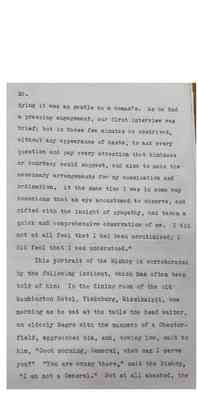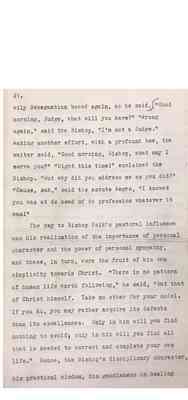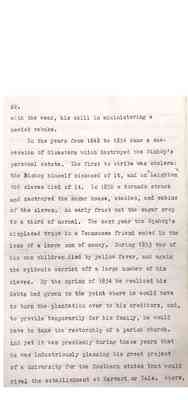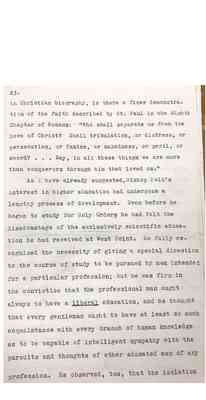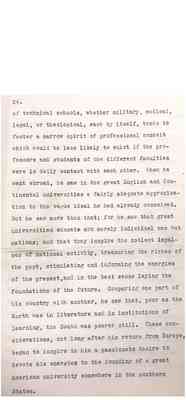Pages
21
-20-
dying it was as gentle as a woman's. As he had a pressing engagement, our first interview was brief; but in those few minutes he contrived, without any appearance of haste, to ask every question and pay every attention that kindness or courtesty could suggest, and also to make the necessary arrangements for my examination and ordination. At the same time I was in some way conscious that an eye accustomed to observe, and gifted with the insight of sympathy, had taken a quick and comprehensive observation of me. I did not at all feel that I had been scrutinized; I did feel that I was understood."
This portrait of the Bishop is corroborated by the following incident, which has often been told of him: In the dining room of the old Washington Hotel, Vicksburg, Mississippi, one morning as he sat at the table the head waiter, an elderly Negro with the manners of a Chesterfield, approached him, and, bowing low, said to him, "Good morning, General, what can I serve you?" "You are wrong there," said the Bishop, "I am not a General." Not at all abashed, the
22
-22-
wily Senegambian bowed again, as he said, "Good morning, Judge, what will you have?" "Wrong again," said the Bishop, "I'm not a Judge." Making another effort, with a profound bow, the waiter said, "Good morning, Bishop, what may I serve you?" "Right this time!" exclaimed the Bishop. "But why did you address me as you did?" "Cause, sah," said the astute Negro, "I knowed you was at de head of de profession whatever it was!"
The key to Bishop Polk's pastoral influence was his realization of the importance of personal character and the power of personal sympathy, and these, in turn, were the fruit of his own simplicity towards Christ. "There is no pattern of human life worth following," he said, "but that of Christ himself. Take to other for your model. If you do, you may rather acquire its defects than its excellences. Only in him will you find nothing to avoid; only in him will you find all that is needed to correct and complete your own life." Hence, the Bishop's disciplinary character, his practical wisdom, his gentleness in dealing
23
-22-
with the weak, his skill in administering a needed rebuke.
In the years from 1848 to 1854 came a succession of disasters which destroyed the Bishop's personal estate. The first to strike was cholera: the Bishop himself sickened of it, and on "Leighton" 100 slaves died of it. In 1850 a tornado struck and destroyed the sugar house, stables and cabins of the slaves. An early frost cut the sugar crop to a third of normal. The next year the Bishop's misplaced trust in a Tennessee friend ended in the loss of a large sum of money. During 1853 two of his own children died by yellow fever, and again the epidemic carried off a large number of his slaves. By the spring of 1854 he realized his debts had grown to the point where he would have to turn the plantation over to his creditors, and, to provide temporarily for his family, he would have to take the rectorship of a parish church. And yet it was precisely during these years that he was industriously planning his great project of a university for the Southern states that would rival the establishment at Harvard or Yale. Where,
24
-23-
in Christian biography, is there a finer demonstration of the faith described by St. Paul in the Eighth Chapter of Romans: "Who shall separate us from the love of Christ? Shall tribulation, or distress, or persecution, or famine, or nakedness, or peril, or sword? ... Nay, in all these things we are more than conquerors through him that loved us."
As I have already suggested, Bishop Polk's interest in higher education had undergone a lengthy process of development. Even before he began to study for Holy Orders he had felt the disadvapntage of the exclusively scientific education he had received at West Point. He fully recognized the necessity of giving a special direction to the course of study to be pursued by men intended for a particular profession; but he was firm in the conviction that the professional man ought always to have a liberal education, and he thought that every gentleman ought to have at least so much acquaintance with every branch of human knowledge as to be capable of intelligent sympathy with the pursuits and thoughts of other educated men of any profession. He observed, too, that the isolation
25
-24-
of technical schools, whether military, medical, legal or theological, each by itself, tends to foster a narrow spirit of professional conceit which would be less likely to exist if the professors and students of the different faculties were in daily contact with each other. When he went abroad, he saw in the great English and Continental universities a fairly adequate approximation to the vague ideal he had already conceived. But he saw more than that; for he saw that great universities educate not merely individual men but nations; and that they inspire the noblest impulses of national activity, treasuring the riches of the past, stimulating and informing the energies of the present, and in the best sense laying the foundation of the future. Comparing one part of his country with another, he saw that, poor as the North was in literature and in institutions of learning, the South was poorer still. These considerations, not long after his return from Europe, began to inspire in him a passionate desire to devote his energies to the founding of a great American university somewhere in the southern States.
